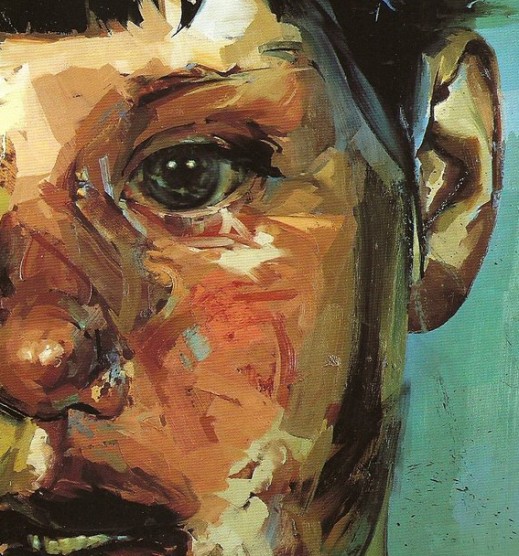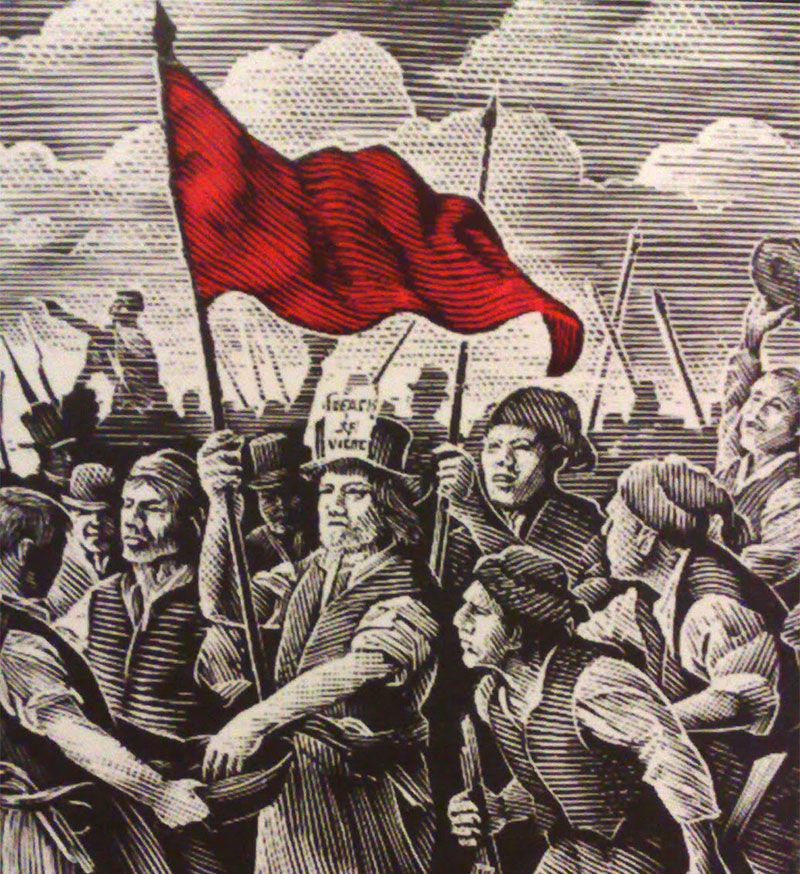
It’s hard to give a toss about language when you’re an English speaker. Because losing your language is not something you’ll ever have to worry about, thanks to the glory days of the British Empire.
English is a dominant language – the third most common in the world. It’s a source of national pride – a gift to the planet. It helped to civilise the fuzzy wuzzies and spread culture and joy throughout distant lands.
So when you hear people bleat on about their language disappearing – it doesn’t really register. There are more important things to worry about in life than some bloke in Aberystwyth demanding bilingual signage on a fish and chip shop.
But what if things were different – if the cultural boot was on the other foot? If the English language found itself under attack. Let’s say those loony UKIP types were right – Brussels really did want to absorb Britain into some creepy all-powerful Euro state.
And that’s exactly what they did.
Germany emerged as the dominant player and German became the common language. It started being used in the legal, government and business worlds, so more English began to learn German as a way to improve their job prospects.
German corporations controlled the media and pushed anti-English messaging. The English language was causing many of the country’s problems – it was dusty and outdated. It helped to explain why the English were such a backwards, thick and bigoted people. The language was holding the nation back – blocking its progress.
Middle-class parents wanted the best for their children, and that meant giving them the gift of German. The BBC began to broadcast more of its output in German. And society started to split and divide along language lines.
Your prospects in life became determined by the language you spoke. German became something for the educated and the powerful. English for the manual classes and the poor – for the people who clean your office toilets.
And within a couple of generations, it was all over for English. It’s now a cultural curiosity – spoken only by weirdos at clog dancing festivals in Northumberland.
As a German speaker, you’re sick of hearing people drone on about their language. You’re sick of them chuntering on about Dickens and Keats and Dad’s Army and The Beatles and all the rest of the cultural twaddle that you don’t understand.
Now, this all sounds absolutely nuts; like the deranged ramblings of some purple-nosed Daily Mail columnist. But this is the kind of thing that happened to Wales and the Welsh language over the past 150 years.
Because back in the 1840s, around 80 percent of people living in Wales were Welsh speakers; many of them spoke no English at all. Fast forward to the 2011 census and that number has dropped to below 20 percent.
But this hides the true scale of the decline.
Welsh used to be the language of the everyday world, people would spend their entire lives never speaking English. Now, it’s rare to hear Welsh being spoken on the streets, apart from in a dwindling number of communities in northwest Wales.
You may not care much about this if you’re an English speaker – it doesn’t affect you. And that includes the majority of Welsh people who were brought up speaking English; who have been taught at English language schools, who watched English telly, listened to English music and read English books.
And I’m one of them. Language was a choice made for me by the school I went to. I was taught to read and write in English with Welsh only taught at secondary school. It was treated in the same way as any other foreign language – like French or German. It gave you tourist Welsh – enough to ask directions to the nearest zoo in Colwyn Bay, and not much else.
So why did Welsh schools stop teaching children to speak the language?
The popular narrative is that it’s just a natural process – a stronger and healthier language replaces an older and weaker one. That the Welsh language is dying of natural causes – like an elderly relative withering away. It’s sad but inevitable. What can you do?
That’s the common explanation.
But the Welsh language declined so rapidly because effective ways were found to smother it. It’s the way that the British Empire used language to control their various colonies during the C19th. It was a benign method of establishing power with minimal bloodshed or confrontation.
Whether it was Ireland, Singapore, Nigeria or North Borneo, the approach was the same. English would be made the official language used for government, commerce and law. Natives chosen for positions of power would be sent to English private schools to learn the language and the ‘British’ way of life.
It would seep down through society, exploiting people’s natural desire to better themselves; to have the best opportunities in life. In doing so, it promoted a form of divide and rule – collaborators versus separatists, English speakers versus native speakers. It was a seed which, once planted, took on a malevolent life of its own – spreading and mutating over generations.

This is what happened in Wales. The country in the C19th was commonly portrayed in the English press as a dangerous and lawless land – Wild Wales. It was a fear fuelled by the growth of Welsh working-class radicalism; the rise of the Chartist movement, outbreaks of rebellion such as the Merthyr Rising of 1831 and the Rebecca Riots of the 1840s.
These were Welsh people joining together to fight against corruption, inequality and injustice. But they were portrayed in the London media as a kind of sub-human rabble; wild and barbaric people who babbled and plotted in their primitive language. It was a view endorsed by the Government; an 1847 report into the state of Welsh education and morality found the country’s population to be dirty, lazy, drunken and over-sexed.
The report concluded that the main problem with Welsh people was their language. And the cure was simple – using the education system to teach them to speak English. It proposed that state-funded English medium schools should be set up – and that’s what happened. It’s one of these schools where I, like most Welsh people, was taught.
So a deranged report by three English inspectors who couldn’t speak Welsh and who didn’t have any background in education became a blueprint for Welsh schooling; the reason so many future generations of Welsh people have been taught only a tourist-level of Welsh.
But the reports other toxic legacy was to give many Welsh people a deep-rooted sense of inferiority and shame about their language. It was no longer something to be proud of, it was a problem; something that needed to be tackled. It was a sickness infecting the country, something the authorities had found a cure for.
The power of this feeling can be seen during the late C19th with the practice of ‘Welsh Not’. The ‘WN’ initials being carved onto a wooden plaque which school kids were made to wear around their neck if heard speaking Welsh in the classroom. The pupil wearing the plaque at the end of the day would be punished or beaten. It was a practice accepted and endorsed by many Welsh parents who wanted the best for their children.
Once the idea had been planted, the ‘medicine’ was largely self-administered. Welsh people widely bought into the idea that their language was a barrier to a better life. English was seen as the language of commerce, as the key needed to access the riches of the British Empire.
This division of the population by language has been eating away at the country ever since. It has created two versions of Wales, two distinct cultures that are kept safely apart in their silos. It has left non-Welsh speakers liable to feel ostracised; forever left out and staring back at a history and culture they can’t access. For Welsh speakers, they have been battered from all sides, endlessly under attack, having to justify the use of their own language, mostly to fellow Welsh people.
A nation which once fought for its rights, which fought against inequality and injustice has been effectively turned in on itself.
Wales remains a husk of a nation. The decline of the language, the stripping away of links to its history and culture, has induced a kind of dementia. It’s a country which doesn’t know who or what it is – so it simply exists. And accepts the guiding hand of its neighbour.
The weakening of the Welsh identity has created a void that’s filled by a tub-thumping brand of Britishness – the royal family, the Armed Forces, Team GB and all that. And there seems little hope of anything changing.
There’s no fight or energy left. No upsurge of anger. No dissent. No political will. No obvious solution. Just a blank stare, a rugby top and a grim Welsh cheeriness; a nihilistic acceptance of fate. While Scotland gains confidence and plans for independence, Wales is left retreating into the arms of its abusive partner and going gently into that good night.
Where does this leave the Welsh person of today? Should we really be keeping so many feet in the past? Cymraeg suffered as a result of progress. The benefits of technology and globalisation far outweigh the romantic belief Cymraeg offers something else.
What we have to do is have children and to put those children into Welsh medium schools. As individuals and groups we have to build positive associations with Cymraeg for these new learners.
We have to create culture, create articulate dissent all the while being nice to each other as ENglish and Welsh speakers. We have to attend the Senedd, to ask questions, to point the finger at negligence. Write blogs and send them. Make films and promote them.
Simple really.
`Cymraeg offers plenty else. The intellectual and adaptive advanced of being brought up with two languages are proven.Very few British people have this huge life advantage and Wales has a massive opportunity to confer a huge benefit to its people. NOt only that, it raises people with an immediate connection to the place of their birth like nothing else can do. I suspect that deep down, the English or British psyche is very scared of a country of 3million on its doorstep – all of whom can converse in a language they don’t understand.
I for one welcome a Wales which teaches bilingualism. You often find in media the representation that Welsh ‘nationalists’ want to somehow end the English language which is nonsense. Pro-Wales people want bilingualism – as if that could EVER be a bad thing? Incredible that the media gets away (as this article suggests) that teaching Welsh could be bad and that creating infrastructure in Welsh like roadsigns is somehow, nationalistic.
Our feet should be moving towards the future, you’re right of course. But a nation totally cut off from its past – has no future. Because people want to refer back to history to debate modern politics, this does not mean they have their feet in the past. When we talk about remembering the War Dead this week – does that mean we have our feet too deep in the past? Of course not. History is everything and to deny history (or that which is inconvenient) is to advocate the peddling of incomplete narratives.
An INDPENDENT Wales would be free to slowly increase bilingualism in schools, and teach its own history, which would preserve the language and culture for the intellectual and spiritual benefit of its people. There is nothing backward about that.